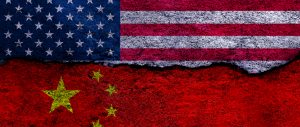On February 1, U.S. President Donald Trump announced that his government would be instituting tariffs on China, Canada, and Mexico for allegedly withholding cooperation needed to stop “fentanyl and other drugs from flowing into our country.” The tariffs were set to take effect at midnight on February 4.
The governments of Canada and Mexico both secured at least a temporary reprieve, with the Trump administration agreeing on February 3 to hold off on enacting tariffs for 30 days in exchange for stepped up border enforcement.
China was not so lucky. As of February 4, all Chinese imports into the United States are subject to an additional 10 percent tariff – on top of the existing duties and taxes put in place under the previous Trump administration. Many analysts have suggested that Trump’s China tariffs are merely a bargaining chip, intended as leverage to strike an eventual deal. But while Trump does have a pattern of announcing tariffs and then withdrawing them in response to concessions from other countries, his China tariffs have been different: the additional duties levied on Chinese imports during his first term are still in place today.
Soon after the tariffs were announced, a Chinese Foreign Ministry spokesperson said that “China firmly deplores and opposes this move and will take necessary countermeasures to defend its legitimate rights and interests.” The statement accused the United States of “severely violat[ing] WTO rules,” adding, “Trade and tariff wars have no winners.”
The game may have no winners, but China is determined not to lose. As the U.S. tariffs entered into force, Beijing responded with punitive measures of its own.
China’s Ministry of Commerce announced on February 4 that China is imposing new tariffs on certain imports from the United States. Coal and liquefied natural gas will be subject to a 15 percent tariff, while crude oil, agricultural machinery, and large cars and pick-up trucks will have 10 percent tariffs. The move was clearly linked in the official announcement to the Trump administration’s use of tariffs against China.
As Reuters noted, China doesn’t import many of its energy needs from the United States. In 2024, U.S. sources amounted to just 1.7 percent of China’s total crude oil imports for the year. U.S. LNG contributed just 5.4 percent of China’s imports, although U.S. LNG sales to China had been growing. The United States is not a major source of coal for China either, accounting for around 3 percent of China’s imports.
In addition to enacting tariffs of its own, China also announced that it was filing a case against the United States at the World Trade Organization (WTO). It’s an entirely symbolic gesture at this point, as a U.S. refusal to approve new adjudicators has left the WTO’s dispute resolution mechanism paralyzed. However, it does allow China to claim the moral high ground, as the Commerce Ministry did in its statement on the WTO case: “China is a firm supporter and important contributor to the multilateral trading system. We are willing to work with other WTO members to jointly address the challenges posed to the multilateral trading system by unilateralism and trade protectionism and maintain the orderly and stable development of international trade.”
Separately, the Ministry of Commerce announced new export controls on tungsten and 25 other rare earth metals. The official readout didn’t reference the U.S. tariffs or frame the export controls as retaliation, instead saying the move was necessary to “better protect national security and interests” and fulfill China’s non-proliferation obligations.
Still, China’s export controls are largely seen as politically motivated. The latest bans fit into a larger pattern of restricting exports of critical minerals to the United States, leveraging China’s overwhelming dominance in processing supply chains to withhold access to materials used in advanced technology.
China also added two more U.S. companies – PVH Corp. and Illumina – to its Unreliable Entities List, again ostensibly for reasons unrelated to the Trump tariffs. The two companies are accused of having “adopted discriminatory measures against Chinese companies, and seriously damaged the legitimate rights and interests of Chinese companies.”
Illumina is a U.S. biotechnology firm. PVH Corp is the parent company of U.S. fashion brands Calvin Klein and Tommy Hilfiger. It has previously come under scrutiny in China for allegedly “discriminating” against cotton produced in Xinjiang – a measure required by U.S. law, which requires companies to assume that goods and materials from Xinjiang were produced using forced labor unless proven otherwise.
As Xing Jiaying noted in a recent article for The Diplomat, China is showing a new willingness to use sanctions on U.S. firms in a substantive – rather than purely symbolic – manner. Beijing’s “recent efforts to leverage its dominance in key markets, such as drones and critical minerals, reflect a growing willingness to weaponize supply chains and impose economic costs on targeted entities,” Xing wrote. But there are limits, as China seeks to avoid “overplaying its hand” and further disrupting its own fragile economy.
This note of caution is implicit in the Ministry of Commerce’s statement on the additions to the Unreliable Entities List. The ministry is well aware of the potential for its stepped-up use of sanctions to have a chilling effect on foreign investment. The statement thus ended by insisting that “China has always handled the issue of the Unreliable Entities List with caution, and has only targeted a very small minority of foreign entities that harm China’s national security, in accordance with the law. Honest and law-abiding foreign entities have nothing to worry about.”
As the trade war heats up, though, both U.S. and Chinese companies will be worrying.
































